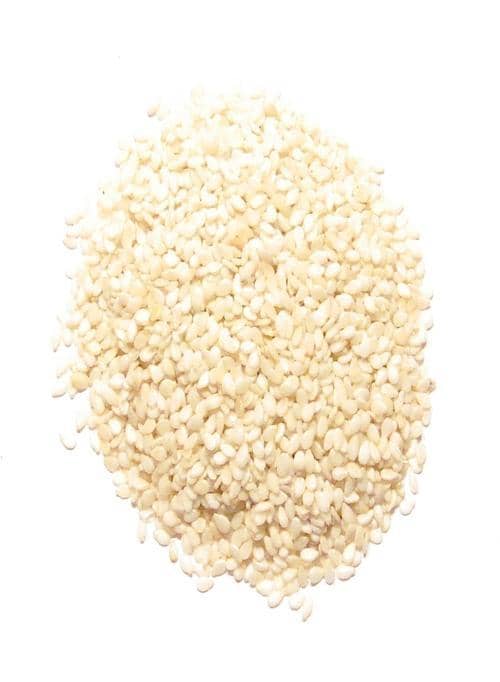
- Description
- Review
Description
Sesame seeds, popularly known as ‘Til‘ in Hindi, ‘Nuvvulu‘ in Telugu, ‘Ellu‘ (Tamil, Malayalam, Kannada), ‘Teel‘ in Marathi and ‘Til‘ in Bengali are the oldest condiment known to mankind. They add a lovely crunch to many Asian and Middle Eastern dishes. It is also a nutrient-dense condiment good for our body. It includes a combination of vitamins and minerals. White sesame seeds have higher iron content than the black ones. Sesame seeds add a nutty taste and a delicate, almost invisible, crunch to many Asian dishes. They are also the main ingredients in tahini (sesame seed paste) and the wonderful Middle Eastern sweet call halvah. They are available throughout the year.
Sesame seeds may be the oldest condiment known to man. They are highly valued for their oil which is exceptionally resistant to rancidity. "Open sesame"—the famous phrase from the Arabian Nights—reflects the distinguishing feature of the sesame seed pod, which bursts open when it reaches maturity.
Sesame seeds, called Til in the local language, are conspicuous with their presence in Indian kitchen cabinets. And why not? These tiny seeds are a powerhouse of healthy nutrients. No wonder, sesame seeds are common ingredients in Ayurveda.
Because of their therapeutic properties, these nutty-flavored seeds have also earned a special place in an alternative system of medicines.
Types of Sesame seeds
Sesame seeds are available as brown sesame seeds, black sesame seeds, and white sesame seeds. White sesame seeds have higher iron content than the black ones. Sesame seeds add a mild crunch and sweet-nutty flavor to recipes. Sesame seeds are added to breads, cookies, and even hummus.
Nutritional facts of sesame seeds
Sesame seeds are loaded with essential minerals, like calcium, magnesium, copper, and zinc. The seeds are also rich in Vitamin B, protein, fiber, and many antioxidants.
Let’s look into some health benefits of sesame seeds
- An excellent source of calcium- The high calcium content of sesame seeds is good for bone health. Sesame seeds also contain zinc, which is important for strengthening your bone structure.
- Regulates Blood Sugar Levels- Some studies reveal that consuming sesame seeds or Til oil controls blood sugar levels in diabetic people. Til contains pinoresinol, which plays an important role in maintaining blood sugar levels.
- Controls Blood Pressure - Certain compounds and polyunsaturated fats present in sesame seeds/oil regulate the blood pressure levels.
- Energy booster- With high levels of fiber, omega-3 fatty acids, and minerals like iron, phosphorus, calcium, and magnesium, Sesame seeds are the organic energy boosters.
- Good for thyroid health- Sesame seeds contain a generous amount of selenium, a mineral essential for thyroid hormones. Therefore, sesame seeds are a great dietary choice to combat thyroid problems.
- Healthy skin and hair- Sesame seeds/Til oil contain organic components that can beautify your skin and hair. In addition to consuming seeds in your diet, you can also get a weekly body and head massage with Til oil for that enhanced glow.
- Improve immunity- Of course, with such an amazing nutritional profile, it's no wonder that sesame seeds boost up your immunity and therefore, make for an excellent dietary choice.
How to consume sesame seeds
- You can lightly roast sesame seeds and chew.
- One can also consume raw sesame seeds. However, someone with digestive issues can soak the sesame seeds for 4 to 5 hours before consuming them.
- There are many snacks available in the stores such as Sesame Seeds Laddu (til ke laddu), Sesame Chikki (bars), and more, that one can munch on.
- One can use Sesame oil (til oil) for cooking purposes.
- Sesame paste is used in tahini and hummus. Sesame seeds can also be added in sweet dishes, stir-fries, breads, and bagels.
